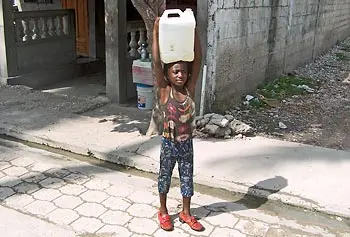Alternative Capstone Class Tackles Real-world Challenge
 Image by Haiti capstone group
Image by Haiti capstone group
04/20/2018
By Katharine Webster
Paul Salibe couldn’t believe how much trash he saw everywhere in Haiti – heaps of plastic bottles and mounds of rubble, with pigs and dogs rooting through them, searching for scraps of food.
“There was trash everywhere and worse poverty than I’d ever seen before,” says Salibe, a senior civil and environmental engineering major who spent spring break in Les Cayes. “I’d heard about it from other students who’d been there, but you couldn’t picture it – you had to see it for yourself.”
Salibe was in Les Cayes to tackle Haiti’s biggest waste problem: untreated sewage. The island nation, the poorest in the Western Hemisphere, has virtually no sewage infrastructure.
He’s one of a dozen civil and environmental engineering students who created their own service-learning capstone project in Haiti, with help from faculty. Their goal: design a model waste disposal system for a single-family home that can be easily adapted and replicated, using basic tools and local materials.
Five of the students visited Les Cayes over winter break with plans for small septic systems. Four also visited over spring break to follow up, this time with designs for toilets.
The sanitation project is part of an outreach program by a large agricultural teaching orphanage, Pwoje Espwa (Project Hope) near Les Cayes. The orphanage wants to help neighboring families whose children attend its schools.
 Image by Haiti capstone group
Image by Haiti capstone group
The Haiti capstone is the convergence of several university programs:
- The service-learning capstone option, started several years ago by Senior Lecturer Edward Hajduk, who oversees the undergraduate civil and environmental engineering major, and Linda Barrington, service-learning coordinator for the Francis College of Engineering;
- Engineers for Change, a student club;
- The student and alumni group Biodigester-Aided Solutions in Haiti (B.A.S.H.), which began as a DifferenceMaker team;
- The Haiti Development Studies Center, founded by Physics Prof. Robert Giles as a base for faculty and students to do research.
Seniors Nicole Belanger and Kayla Dooley are the driving force behind this year’s Haiti capstone. Last year, they revitalized Engineers for Change and joined B.A.S.H., which is designing a biodigester to convert pig manure from the orphanage farm into fertilizer and methane fuel.
 Image by Haiti capstone group
Image by Haiti capstone group
Belanger, Dooley and their friends in Engineers for Change had been looking for a service-learning capstone project – and they decided this was it. A smaller group will also keep working on the biodigester, with help from alumna-turned-mentor Maureen Kelly ’15, ’16.
The college agreed to pay for the students’ plane tickets to Haiti, and Engineers for Change held fundraisers to cover the cost of supplies, local transport and their stay at the Haiti Development Studies Center. Belanger and Dooley also recruited a new faculty member who specializes in clean drinking water, Asst. Prof. Onur Apul, to help Barrington teach the course.
The 12 seniors spent the fall semester learning everything they could about septic system design, from how to conduct percolation and soil tests with hand tools – a shovel, a ruler and sieves – to how to measure elevations using only a laser and level and then draw up site and technical plans.
But shortly before the first students visited Haiti in January, they learned that their mission had changed. The orphanage’s project manager asked students to explore alternative designs – such as composting toilets or a container-based system – better suited to the area’s high water table, which can make it too expensive to build septic systems that won’t contaminate nearby wells.
 Image by Haiti capstone group
Image by Haiti capstone group
“We learned that you have to be adaptable,” Belanger adds.
On their visits to Haiti, the students learned two important things: Haitians prefer squat toilets, and it’s dangerous for women and children to go outside at night to use a latrine. That led all of the teams to design indoor toilets in a small room with a drain in the floor and a sink.
In March, the orphanage’s project director asked the students to continue working on designs for a urine-diverting toilet with two holes. One hole diverts urine through a pipe into a leach field, where it can even fertilize certain plants. The second hole is for solid waste, followed by soil or sawdust to control odor. The solids fall into a simple concrete tank with a vent for gas and air circulation. After the mixture biodegrades for six months or more, it can be shoveled out and safely returned to the environment.
A group of students has already signed up for the Haiti capstone class next year, and Dooley and Belanger plan to return to Les Cayes to keep working on projects there, while mentoring next year’s seniors.
Both are fielding full-time job offers, and the Haiti project comes up in every interview, Belanger says. She’s already working part time at a geotechnical firm and plans to go on for her master’s degree in geoenvironmental engineering so that she can continue working on clean water and sanitation projects.
"This project has been an eye-opening and life-changing experience. I’ve fallen in love with Haiti and can’t wait to continue my work there,” Belanger says. “The project truly made me appreciate the smallest things we take for granted, like toilets, and also made me realize how much work goes into what appears to be a simple sanitary solution."




